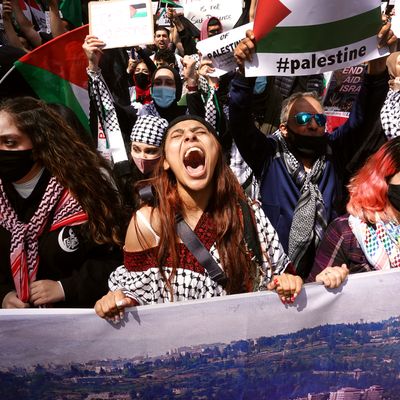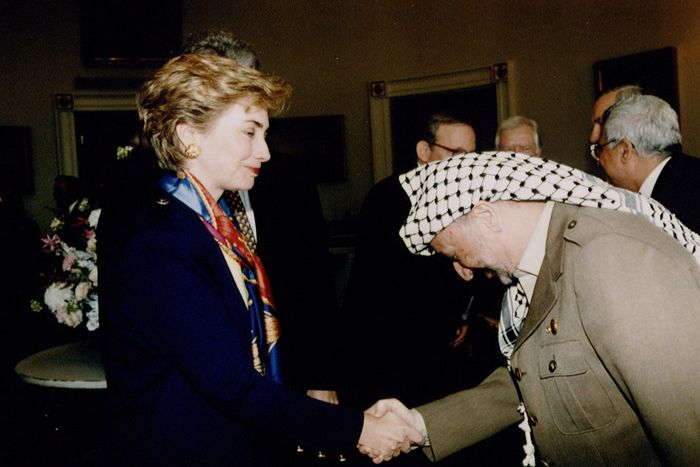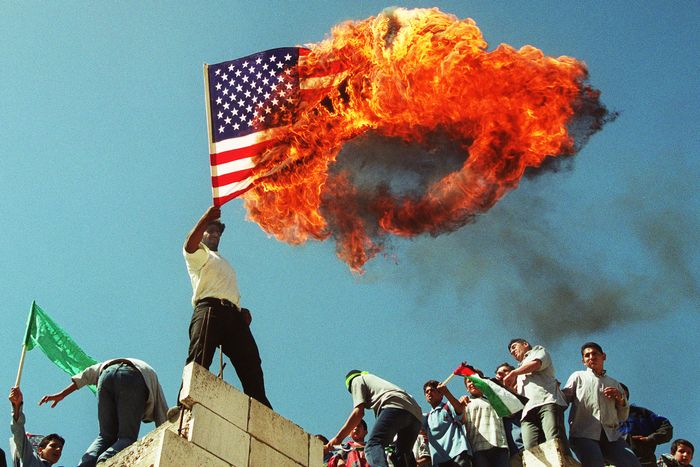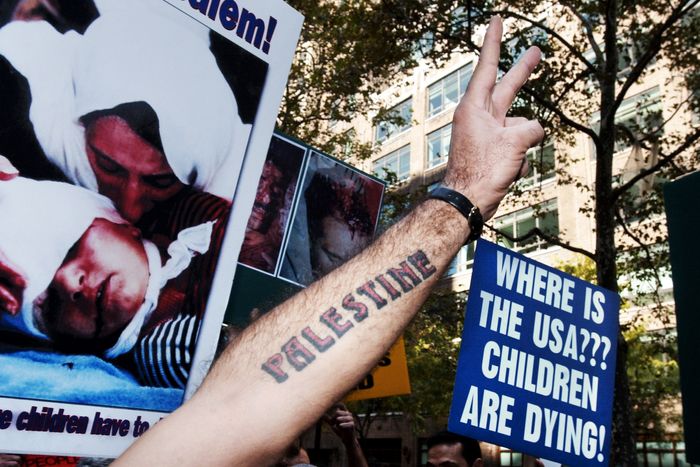
Violence in Israel and Palestine has a way of commanding attention in the United States. On Wednesday morning, Joe Biden’s call for a “significant de-escalation” in the conflict adorned the front pages of the Washington Post and New York Times. On American social media, running arguments between Likudnik and pro-Palestinian forces fill the gaps between debates over mask etiquette and Demi Lovato’s nonbinary identity.
Which, on one level, is curious.
There are, after all, many atrocities and regional conflicts transpiring in the world today. And in many respects, the Israeli-Palestinian conflict is unexceptional. The number people involved is not notably huge; about 14 million people live in Israel, Gaza, and the occupied territories. By contrast, 112 million people live in Ethiopia, where an ongoing ethnic conflict has yielded thousands of deaths and a government crackdown on the press. Israel’s human-rights violations against the Palestinians are abominable, but they are no graver than those perpetrated by China’s government against the Uighurs or Myanmar’s against the Rohingya. Finally, Israel-Palestine has little bearing on America’s present economic or geopolitical interests. The U.S. alliance with Saudi Arabia no longer serves any strategic purpose, and the Saudi government no longer has much interest in the Palestinian plight, anyway.
And yet, Israel-Palestine looms larger in American discourse than any of those other conflicts.
Apologists for Israeli apartheid often invoke this fact to discredit the state’s U.S. critics: What, beyond anti-Semitism, could explain their fixation on this particular foreign affair? In his Wednesday newsletter, Matthew Yglesias rejects this explanation. Rather, he suggests that the true reason for the prominence of Israel and Palestine to Americans is, essentially, “Some people started talking about it, not knowing what it was, and they’ll keep on talking about it forever just because.”
Israel and Palestine are small nations and not strategically significant these days, so it’s notable that conflicts there attract not just more, but orders of magnitude more coverage than conflicts in, say, Chad, that objectively impact more people. And if human rights observers ding the government of Chad for something, you won’t see a swarm of people who feel Chad has been unfairly maligned swooping in to “Stand With Chad.”
The basic story is that people talk a lot about Israel/Palestine because a lot of other people are talking about it. Making a public statement about Israel says something about you. Indeed, it’s so widely discussed that a huge range of different nuances is legible. Bernie Sanders’ comments are very critical of Israel, but he also affirms that “Israel has the absolute right to live in peace and security,” thus separating himself from the most critical voices.
Yglesias’s post makes some fine points. And I think his implicit challenge to his readers — to consider how much of their political engagement is guided by the will to self-expression, and how much by the will to minimize suffering — is a worthy one. But the notion that Israel-Palestine discourse is an arbitrary, self-perpetuating phenomenon is glib.
Offhand, I can think of three reasons why the conflict attracts so much concern in the U.S.:
1) American Jews are heavily overrepresented in U.S. politics and media.
I’m a Jew. Yglesias is a Jew. As he notes in his post, the current U.S. “Secretaries of State, Treasury, and Homeland Security are all Jewish, as are the Attorney General, the White House Chief of Staff, and the Director of National Intelligence.” It’s not terribly mysterious why American Jews would pay more attention to the Israeli-Palestinian conflict than hostilities between the Tigrayans and Oromo in Ethiopia. And given Jews’ influence over American political culture, it makes sense that U.S. discourse would bear some reflection of our concerns.
The Israeli-Palestinian conflict doesn’t just concern American Jews because some of us have friends and family in the region. Even among those with no such kin ties, Israel can be fundamental to ethnic and self-identity. This is true of anti-Zionists and Likudniks alike. Whether the weight of Jewish heritage leads one to embrace ardent nationalism or disavow ethnocentrism, Israel is the theater of conflict over which conception of Jewishness is correct; or, to put a finer point on it, over how the suffering of one’s forebears can be redeemed.
My own investment in the conflict derives from such concerns. At a young age, I learned that my grandmother’s father had been buried alive, that her 15-year-old sister had been hung in the town square, and that her mother and brother perished in concentration camps, all before she hit puberty. How to reconcile such information with the idea that life can be meaningful — and human existence worthwhile — has been one of my preoccupations ever since.
Like many descendants of survivors, I was raised on a Zionism informed by persecutory delusions: The mainstream media was biased against Israel; Hillary Clinton was an anti-Semitic apologist for terrorism. At some point in middle school, I remember reading an issue of Spin in my town’s Barnes & Noble, discovering that Belle and Sebastian were critical of Israeli policy, and feeling crushed to learn that the people behind If You’re Feeling Sinister hated Jews.
So it was rather disorienting when I actually started reading about Israel’s founding, and the Nakba and the occupation and the blockade. The reality of the Palestinian plight hit me with the force of revelation. The “good Germans” were not exceptional. And neither were the Jews. Even the best humans on planet Earth, my parents, were susceptible to tribalistic propaganda that abetted the oppression of the vulnerable. Thus, redeeming my grandmother’s suffering meant pushing back against our species’ affinity for in-group chauvinism and out-group disregard — which meant insisting upon universal humanism over ethnic nationalism, which meant opposing Israeli apartheid.
This is why Israel-Palestine looms larger in my consciousness than other distant conflicts. It’s why, in 2014, when I walked by a group of Jews demonstrating in support of Israel’s bombardment of the open-air prison that is Gaza — in the name of Holocaust victims — I was overcome by despair and impotent rage.
Jews who take a different interpretation of their inheritances and obligations appear to feel similarly when they encounter sentiments like mine. And such emotions are the stuff of which engagement and virality are made.
2) The U.S. is more heavily implicated in Israel-Palestine than in other foreign conflicts.
Yglesias argues that, in the present context, America’s support for Israel is of little consequence. Israel is a rich country and does not need our aid. The Gulf States have decided they’d rather make common cause with Israel in a regional struggle against Iran than support the Palestinian cause. We just don’t matter much in this equation.
This is a reasonable hypothesis. But it hasn’t really been tested. The U.S. government hasn’t applied serious pressure to Israel in decades. We don’t know what would happen to Israel’s domestic politics if America cut off aid, supported critical resolutions at the U.N., and encouraged its allies to apply pressure. The U.S. government certainly has the capacity to influence events in the region. If Uncle Sam gave Israel the Iran treatment — and cut off its access to the American financial system, while placing secondary sanctions on its trading partners — it would surely have greater incentive to make concessions. And were Israel to start treating Palestinians within the green line as full citizens, and adopting a conciliatory posture toward the West Bank and Gaza, it seems likely that Hamas (or at least, its most militant elements) would be weakened. Such a U.S. foreign policy is politically unthinkable, and all sanctions are suspect on humanitarian grounds. But the U.S. state is not powerless here.
Regardless, whatever U.S. policy’s contemporary relevance to the conflict, American support was integral to Israel’s founding and development. As a nation, we’re pretty darn implicated in what the state has become. So when Israel starts dropping bombs, it makes sense that we talk about it.
3) Propagandistic policies and media coverage have made the issue more salient for the American left.
Finally, I think one reason why American leftists devote so much attention to the Palestinians’ oppression (beyond the fact that a wildly disproportionate percentage of American leftists are Jews) is that America’s mainstream institutions have gone to extraordinary lengths to obscure that oppression. Few (if any) forms of political expression are more aggressively suppressed in the U.S. than anti-Zionist dissent. Seventeen U.S. states have passed laws that penalize businesses and individuals who endorse boycotts of Israeli settlements. Academics are routinely fired for pointed criticisms of Israeli violence. And the State Department’s official definition of anti-Semitism suggests that calling Israel — which is, at present, a de facto apartheid state — a “racist endeavor” is tantamount to hatred of Jews.
Meanwhile, for the bulk of my lifetime, the discrepancy between mainstream coverage of Israel and Palestine in the U.S. and reporting on the conflict from overseas outlets and independent journalists on the ground has been exceptionally large. This is in part because it has been standard practice at America’s major newspapers to entrust straight reporting on the conflict almost exclusively to Jewish Israelis, including ones with familial ties to the Israeli army and government. Which is to say, historically, Israel has been the issue where the American media’s propagandistic function has been most visible.
For these reasons, Israel-Palestine is a radicalizing subject for many leftists who have no ethnic or religious tie to the region. To discover the reality of the occupation and blockade isn’t just to lose faith in Israel but also in the integrity of a wide array of America’s mainstream institutions. Which makes the Israeli-Palestinian conflict into something more than some foreign affair. For many U.S. leftists, to unabashedly support Palestinian liberation is also to register one’s dissent against their own country’s hypocritical and mendacious political and media Establishments.
Granted, the radicalization of some American liberals is more a consequence of Israel-Palestine’s prominence in U.S. discourse than a cause of it. But I do think it’s becoming more of the latter, as the left amasses influence on social media and in Congress.
I don’t think this list is remotely comprehensive (Israel’s role in the Christian right’s eschatology is also surely a factor). But it seems sufficient to establish that Israel-Palestine prominence in U.S. discourse is not some arbitrary fixation. There may be a realistic argument for progressives to de-prioritize Israel-Palestine in light of the strength of the Israel lobby, the uncertain efficacy of changes to U.S. policy that are within the realm of plausibility, the potential costs of alienating pro-Israel voters, and the (arguably) greater potential for progress on less salient — but equally morally compelling — injustices. I’d guess that sympathy for this line of thought informs Yglesias’s column. And I think that’s a reasonable point of view. But such realism also strikes me as unrealistic, precisely because America’s collective preoccupation with Israel and Palestine is not random; for disproportionately influential factions within the polity, it is foundational to political identity.

































